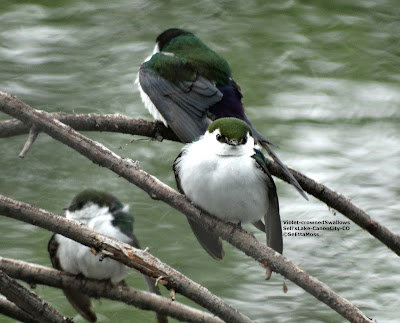Some ways to keep our backyard birds healthy
News headlines have described how much of the continental U.S. is either in record high temperatures this summer, or severe drought conditions, or both. Birds, and other wildlife, are being affected by these extreme conditions in many areas. You can help them out by providing clean and fresh water.
Birds like the American Robins in the poster above pant with their beaks open to cool themselves. They have several other strategies to cool off but one that appears most enjoyable, at least to those who are watching, is taking a dip in a bird bath. So be sure to keep fresh water in that bird bath and do keep it clean.
[caption id="attachment_16258" align="aligncenter" width="350"]
Suet and commercial suet cakes are often very effective at bringing birds in to feed on this high fat food. But there are problems with feeding fat-based food during warm and especially hot weather.
From the website of the Cornell Lab of Ornithology, the folks who study birds: "Avoid offering unprocessed suet in hot weather—it quickly becomes rancid. If you want to offer suet year-round, commercial suet cakes are preferable, but check the package recommendations. Another suggestion is to put out only small amounts of suet, keeping the rest refrigerated until needed. A good warm-weather alternative to suet is a mixture of one part peanut butter to five parts cornmeal."
Another food that has some health issues that many backyard bird watchers are putting out to draw orioles and other birds is jelly. The folks at Cornell Lab of Ornithology provide the following important information and caution: "Make sure to only offer very small quantities at once, because jelly gets extremely sticky; small birds can become mired in it. Also, jelly has much higher sugar concentrations than any natural food. It’s probably not unhealthful for adult birds to supplement their diets during severe food shortages associated with unseasonable cold spells in spring, or in small quantities during the rest of the year. "
This oriole mom in the photo above is bringing some nutritious food (insects are high in protein that baby birds like human babies need for healthy development) back to her babies. However, oriole mom's don't know the nutritional content of the foods we offer them and a harried bird mom will bring an easy meal from a feeder back to her babies that may not be healthy for them.
Ornithologists note that jelly is not going to meet the nutrition needs of growing young birds: "Sometimes adult orioles and other birds visit jelly for a quick snack while searching out insect food for their young in summer; this won’t hurt them, but bring in the jelly if adults are bringing their young to it more than once a day. Growing fledglings need proteins far more than carbohydrates, and jelly is probably a very unhealthy meal for them."
Birds are not much different than you and me when it comes to needing nutritious and safe foods to be healthy.
"
"


Comments